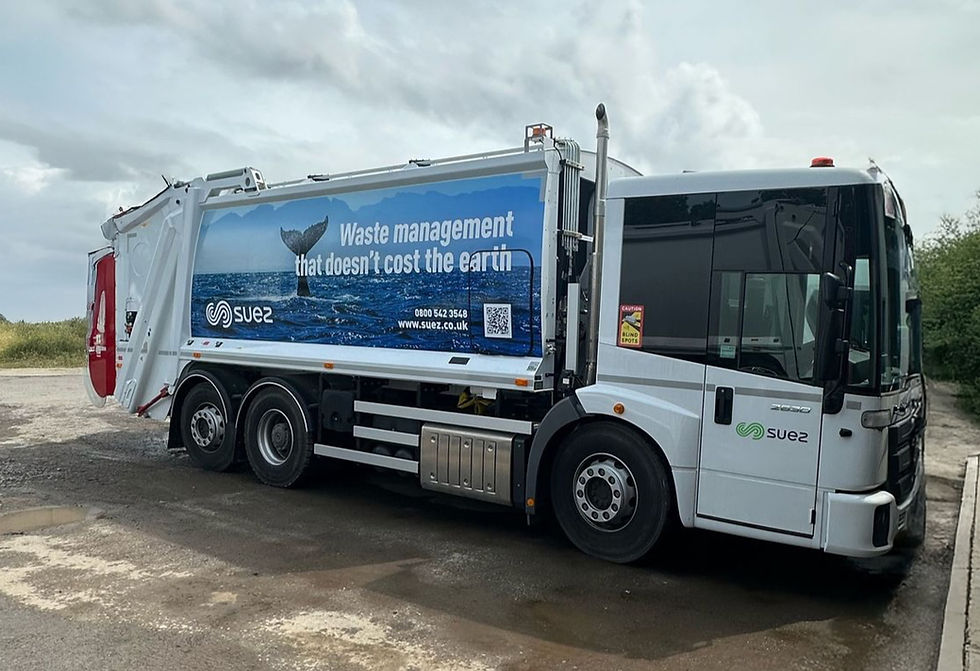Vehicle Graphics Design That Works in the Real World
- Tasha

- Oct 13, 2025
- 3 min read
Part 5 of our Vehicle Graphics Series: Making Vehicle Branding Work for You
In Part 4, we looked at why materials matter and how the right vinyl can make the difference between graphics that last for years and ones that fail within months.
Now let’s talk about the next piece of the puzzle: design that works in the real world. Because even the best materials won’t save a poor design.
Design for How You Actually Use Your Vehicles
The most effective vehicle graphics aren’t just good-looking; they’re well thought through. A van that spends its life parked outside homes needs a very different design from one that’s constantly on the move.
If your vehicle sits outside customer sites or properties most of the day, you’ve got time on your side. People can stop, read, and take in details, short service lists, contact information, even a tagline.
But if your vehicle spends most of its life on A-roads or motorways, it’s a different story. At 60 mph, less is more. Clean branding, bold shapes, and clear messaging will always beat clutter. The goal isn’t to say everything, it’s to be remembered.

The SKY Vans Example
The SKY fleet is a well-known example often cited within the industry as vehicle branding done right; with so many different designs, featuring scenes from TV shows and films but they all share a single, powerful word: SKY.
No web address. No call to action. Just strong, consistent design. It’s confident and instantly recognisable, proving that simplicity done well always wins, a great example of creative branding executed brilliantly by their team.

Closer to Home: K Transport & SUEZ
We take a similar approach with the vehicles we design for K Transport. Their trucks don’t need slogans or long service lists, the branding does all the work. It’s clear, professional, and unmistakable on the road.
And while we don’t design the SUEZ graphics ourselves, their wraps are a brilliant example of strong marketing by their communications team. The new livery carries the message “Waste Management that doesn’t cost the earth”, paired with stunning wildlife and landscape imagery. The logo itself is deliberately small, less than a twentieth of the overall design because the message is what matters most.
It’s proof that impact doesn’t always come from making your logo bigger. Sometimes, it’s about saying something that resonates.

Consistency Builds Trust
If you’ve got more than one vehicle, brand consistency matters. It’s what makes your business look professional and reliable, whether you’ve got two vans or two hundred.
We handle national fleet work where consistency is everything. Over time, we’ve seen what happens when designs get passed from one supplier to another, colours drift, fonts change, proportions slip, and suddenly the fleet looks disjointed.
By keeping your design, production, and fitting all under one roof, you get control over the details: colours, layouts, and templates stay exact. That consistency builds recognition and recognition builds trust.
Design That Performs, Not Just Impresses
Good design isn’t just about how it looks; it’s about how it works. It should grab attention, communicate quickly, and reflect your business values, all within seconds.
The best wraps aren’t about shouting louder; they’re about being clear, confident, and visible where it matters.
In the final part of our Vehicle Graphics Series, we’ll cover what happens after the wrap is fitted, how to look after it, keep it performing, and make sure it still looks great years down the line.
We’ll share simple maintenance tips that make a big difference and explain why a little care goes a long way when it comes to protecting your investment.





Excellent post! Vehicle graphics design is more than just visual appeal — it’s about functionality, visibility, and brand consistency on the move. I appreciate how this article emphasizes real-world application just like online logo animation services, ensuring designs remain impactful and legible across different environments and lighting conditions.